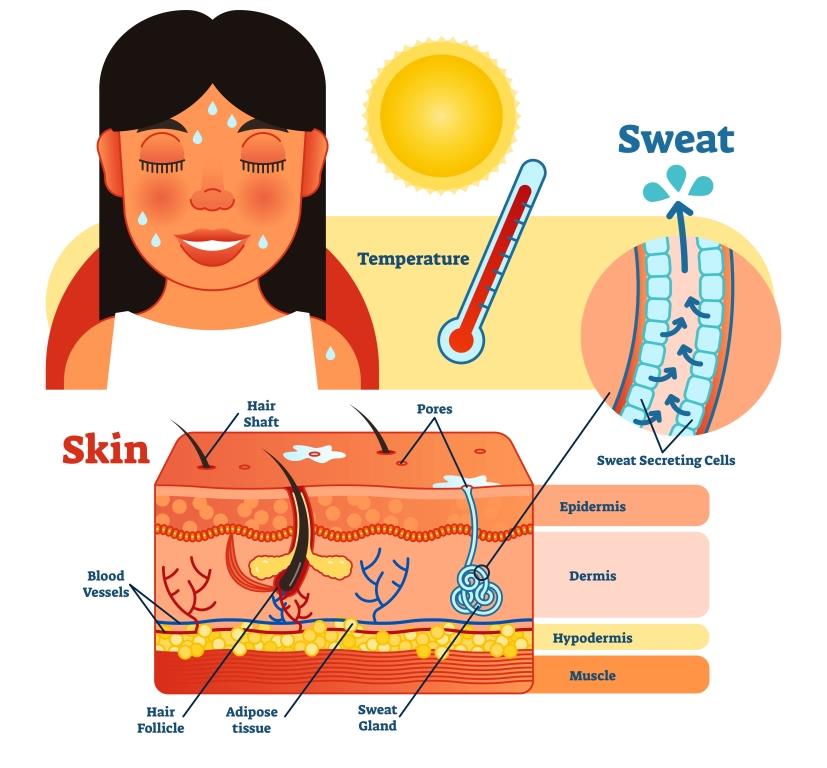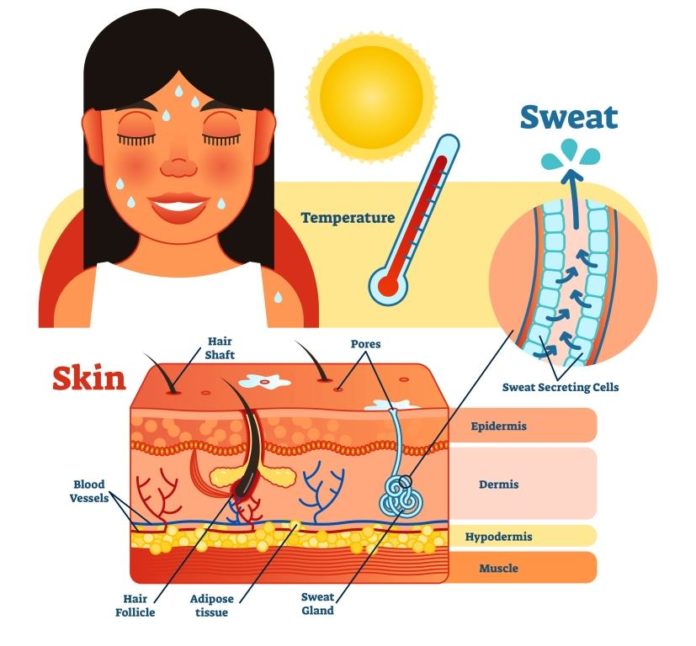Source: The Conversation (Au and NZ) – By Tom Bailey, Research Fellow, The University of Queensland
If you’re hot and sticky even before your daily commute, you might ask why you sweat so much.
Sweating is usually the body’s way of stopping you overheating. But for some people, sweating becomes a problem. Either they sweat for no obvious reason or (as Prince Andrew admitted last year) not at all.
So why do some people sweat more than others? And what can you do about excess sweating?
Read more: Anhidrosis: why some people – apparently like Prince Andrew – just can’t sweat
Remind me again, why do we sweat?
Humans need to regulate their internal body temperature to keep it constant, even when the environmental temperature rises, perhaps on a hot day, sitting in a hot-tub or running for the bus.That’s because a rise in internal body temperature can lead to our organs overheating, fatigue, heat exhaustion and heat stroke.
Preventing severe heat gain requires a careful balance between the heat our body produces (from everyday metabolism), heat from the environment and the heat our body loses.
Read more: The skin is a very important (and our largest) organ: what does it do?
Our bodies are well-designed for this. We have special temperature sensors in our skin and central nervous system (brain and spinal cord) that send signals to the body’s thermostat in the brain to alert it to increases in body temperature.
The body’s largest organ, the skin, is also designed to remove heat from the body. The most noticeable way is losing heat via evaporating sweat.
Read more: Curious Kids: What happens in the body when we sweat?
How does sweating cool us down?
When our skin or core body temperature rises sufficiently, the thermostat in the brain sends impulses via our central nervous system to increase blood flow to the skin. The thermostat also activates the sweat glands.
Our sweat glands release droplets onto our skin that become vapour when the blood flowing through the skin passes underneath.
As the sweat vaporises, energy (in the form of heat) passes into the environment, cooling the blood. This cooled blood gets circulated back to the heart and brain, and cools our core body temperature.

This is why a day in the sun can feel so draining. Your body is working much harder and using much more energy to keep you cool.
By preventing our organs from overheating, sweat not only keeps us healthy, it also allows us to enjoy (or tolerate) the hot Australian summer.
So it’s important to stay hydrated on a hot day so your body can produce and replace the volume of sweat necessary to keep you cool.
OK, but why do I sweat so much?
You might find yourself sweating more or less than usual for a number of reasons, other than it being a hot day.
Exercise
Exercise improves our ability to produce sweat and keep cool. People who exercise regularly (particularly in the heat) can produce more sweat during exercise. This helps our bodies perform longer, with less physiological strain.
So many of the Australian Olympic athletes will undergo a period of heat acclimatisation in the lead up to Tokyo 2020.
Read more: Why is Japan’s Olympic marathon shifting cities to avoid the heat? A sports physiologist explains
Stress
Ever notice you become sweaty when you are stressed? A different type of sweat gland, the apocrine sweat glands, are associated with hair follicles and often respond to emotional stress.
This type of sweat combines with bacteria on your skin and causes body odour.
Menopause
Up to 75% of women experience acute bouts of excessive sweating during menopause, called a hot flush.
The amount of sweat produced during a two to three minute hot flush can be similar to the amount produced during exercise.
Most people think hot flushes are caused by increases in core body temperature. But our research suggests this might not be the case.
Drinking alcohol
Having a couple of drinks with friends may also increase the sweat response. Alcohol raises your heart rate and causes the blood vessels in your skin to relax and widen. This increases skin redness and your sweat rate, which can actually lead to decreases in body temperature.
So, what can I do about it?
Excessive sweating (hyperhidrosis) can happen in unusual situations such as in a cooler climate or with seemingly no cause.
Although it can be embarrassing and uncomfortable, there are ways to treat it, which you can discuss with your doctor.
One option is to use an antiperspirant with aluminium or topical aluminium salts, which blocks the sweat glands from releasing sweat onto the skin.
Read more: Health Check: do men really sweat more than women?
A longer-term option may be injecting Botulinum toxin (commonly known as Botox) into the skin. This paralyses the injected area (such as the armpits, hands and feet) and prevents the activation of sweat glands.
Other options include using low frequency electrical stimulation (iontophoresis), prescription drugs and although controversial, surgery.
For menopausal women, we have shown closely supervised exercise training can improve temperature regulation, leading to fewer and less severe hot flushes.
This training involved 16 weeks of supervised, progressive moderate-intensity aerobic exercise, such as treadmill and cycling exercise, for up to one hour for three to five days a week.
In a nutshell
In the end, sweating is usually our body’s natural way to protect us from overheating. But if excess sweating is a problem, see your doctor who will outline which treatment options are best for you.
– ref. Why do I sweat so much? – https://theconversation.com/why-do-i-sweat-so-much-131135








